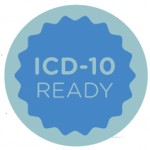
In 2012, the healthcare industry applauded when the Centers for Medicare and Medicaid Services (CMS) finalized a rule to move the deadline to implement the Tenth Revision of the International Classification of Diseases (ICD-10) from October 1, 2013, to October 1, 2014. The new ICD-10 code set—representing a substantial increase in diagnosis codes—seems to be rolling full steam ahead, with only 18 months before the curtain lifts to bill these new codes. Will that timing stand?
Transitioning to ICD-10 will have a major impact on the entire healthcare industry. This undertaking will be significant for all providers, payers, and system vendors, requiring planning and preparation across all organizations. It will also affect an array of practice management systems, including electronic medical records and practice management systems. In response to the effects of ICD-10 implementation on providers, the American Medical Association (AMA) passed a resolution at its November 2012 meeting to skip the implementation of ICD-10 and move directly to ICD-11, which is scheduled to release its beta phase in 2015. The ACR is cognizant of the financial impact that ICD-10 will have on your practice. That is why we signed the AMA resolution to stop the implementation as well as the letter that was sent to CMS about this decision.
If a delay is not enacted by Congress, the curtain will continue to rise on compliance. Will you be ready? A smooth, successful transition to ICD-10 without any negative consequence requires a well-planned and well-managed implementation process. Proper planning and preparation is critical to controlling your ICD-10 investment and moving beyond compliance to financial success.
Discuss Implementation with Staff and Vendors
Implementing ICD-10 will require instituting system changes and training staff. Your staff will need to understand the new code set, and your vendors will need to verify that your system is ready to accept the new codes and transmit them properly for payment. Where should you begin? You will need help from your practice administrator and your staff to organize communication with both internal and external stakeholders.
Working with Your Vendors
You and your staff will need to identify all the systems in your practice that will be affected by the implementation of ICD-10 codes, including patient registration, data management registries (e.g., Rheumatology Clinical Registry), electronic health records, clinical lab systems, and practice management systems for eligibility and/or prior authorization.
This task will require you and your practice administrator to talk with each of your vendors and find out where they are with system compliance for ICD-10. If you have multiple systems that require upgrading, you will need to coordinate with each vendor and sequence the upgrades to minimize any downtime in the practice. Below is a checklist for your practice when implementing your system changes for ICD-10:
- Start communicating with all of your vendors early to determine what systems will need to be upgraded;
- Discuss dates and times for system upgrades and/or installation, e.g., weekends, after hours, or during the week;
- Identify which systems, if any, will be down during the upgrades;
- Coordinate the timing of your electronic and manual system changes to best fit the needs of your practice; and
- Find out if there will be additional charges for any of the upgrades to your system(s).
Remember that your staff will be greatly affected by any system upgrades. Make sure to keep them informed of the planned changes, the timeline for when the changes will be completed, the expected training times, and any other important information so the workflow process will not be interrupted.
Preparing Your Practice
Staff training is a key area for your practice’s success and now is a good time to identify specific individuals to be the main contact for ICD-10 development and training. It is a good idea to have your lead coder/biller assigned to training and information on the code sets, while your practice managers and/or managing physicians can be involved in the impact assessment and transition planning.
Key staff members that will need the most training are those involved with coding and documentation. The list below identifies practice staff and the level of training needed:
- Administrative staff: Your schedulers, receptionist, etc., will need only an overview to get a general understanding of the new structure of ICD-10 codes. Your coders/billers will require the most training on the new code set. It is essential for this group to clearly understand the new code structure, coding guidelines, and conventions to deliver the highest level of specificity in coding for ICD-10.
- Clinical staff: Your physician assistant(s), nurses, nurse practitioner(s), etc., need training on the clinical concepts and level of detail in ICD-10 to promote better documentation. Physicians will require the most training on the new code set. Like your coders/billers, it is essential for all physicians in your practice—including yourself—to clearly understand the new code structure, coding guidelines and conventions to deliver the highest level of specificity in coding for ICD-10.
Tips for Staff Training
- Categorize the level of training needed for specific staff members;
- Coordinate the timeline for training and work with staff for completion of training;
- Identify the training format that will work best for your staff (e.g., classroom, Web-based, conference, etc.);
- Determine the amount of downtime the office will need during training; and
- Identify additional resources that the staff will need after training.
Coders and billers will need to take a proficiency test in diagnosis coding. This is a good time to have your staff educated on human anatomy and physiology to prepare them for the new code set. For more information on the proficiency exam, visit www.aapc.com.
Implementing ICD-10 will be challenging and costly. Early preparation is vital to survival in rheumatology practices. Using a phased approach with a preparation checklist is the key to success. Below is a list of key areas that should you should take into consideration:
- Organize an implementation effort;
- Develop a communication plan;
- Conduct an impact analysis;
- Estimate a budget/cost analysis;
- Contact system vendors; and
- Educate and train staff.
The ACR will continue to provide education and updates for ICD-10 through webinars, face-to-face training meetings, and sessions at the ACR/ARHP Annual Meeting in an effort to prepare members and their staff for implementation. For more information, contact Antanya Chung, CPC, CPC-I, CRHC, CCP, director of practice management, at [email protected] or (404) 633-3777.

